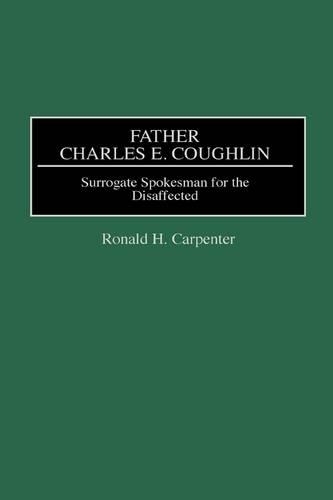
Father Charles E. Coughlin: Surrogate Spokesman for the Disaffected
(Hardback)
Publishing Details
Father Charles E. Coughlin: Surrogate Spokesman for the Disaffected
By (Author) Ronald H. Carpenter
Bloomsbury Publishing PLC
Greenwood Press
8th April 1998
United States
Classifications
Tertiary Education
Non Fiction
Biography: historical, political and military
Social and ethical issues
Social welfare, social policy and social services
Social and cultural history
History of the Americas
282.092
Physical Properties
Hardback
224
Description
As Americans moved from farms and small towns to large cities, they tended to lose a hallmark of their earlier life: comparatively direct participation in the discourse of pragmatic affairs. The ubiquitous radio, which became a primary medium of communication during the Great Depression, tended to make Americans listeners more than speakers about important issues. Nevertheless, as the economic catastrophe of the time evoked desires in people to express their hopes and fears for the future, Americans nevertheless tended to be reticent. They instead bestowed leadership on speakers who articulated those hopes and fears on their behalfparticularly orators who effectively utilized radio. Possessed with the ability to deliver speeches exceptionally well and to phrase ideas so eloquently as to be admired by listeners, Father Charles E. Coughlin emerged as that surrogate spokesperson for many Americans. Moreover, because the medium of radio endowed his discourse with a credibility enhanced by his own ethos, he emerged as a persuader who fulfilled the mass media role known as opinion leadership. He also capitalized on the inherent advantages of orality as a significant factor that influenced how people responded to the myriad messages of the vast communication mosaic in which Americans lived at the onset of the electronic age. Father Coughlin exemplifies that speaker who achieves the role of an opinion leader in contemporary society.
Reviews
Carpenter has written and excellent book on Coughlin. Like all of Carpenter's work, the book is well-researched and well-written, painting an intriguing picture of Coughlin as one of the major orators of the 1920s and 1930s. Carpenter carefully describes Coughlin's use of the new medium of radio. He describes Coughlin's relationships with the two other masters of radio, Franklin D. Roosevelt and Huey Long, and speculates whether a person like Coughlin would be effective in the age of television and the internet.-Rhetoric & Public Affairs
In general, the book avoids a broad biographical or political portrait of Coughlin as that has been done by others.-CBQ
"In general, the book avoids a broad biographical or political portrait of Coughlin as that has been done by others."-CBQ
"Carpenter has written and excellent book on Coughlin. Like all of Carpenter's work, the book is well-researched and well-written, painting an intriguing picture of Coughlin as one of the major orators of the 1920s and 1930s. Carpenter carefully describes Coughlin's use of the new medium of radio. He describes Coughlin's relationships with the two other masters of radio, Franklin D. Roosevelt and Huey Long, and speculates whether a person like Coughlin would be effective in the age of television and the internet."-Rhetoric & Public Affairs
Author Bio
RONALD H. CARPENTER is Professor of English and Communication Studies at the University of Florida.
